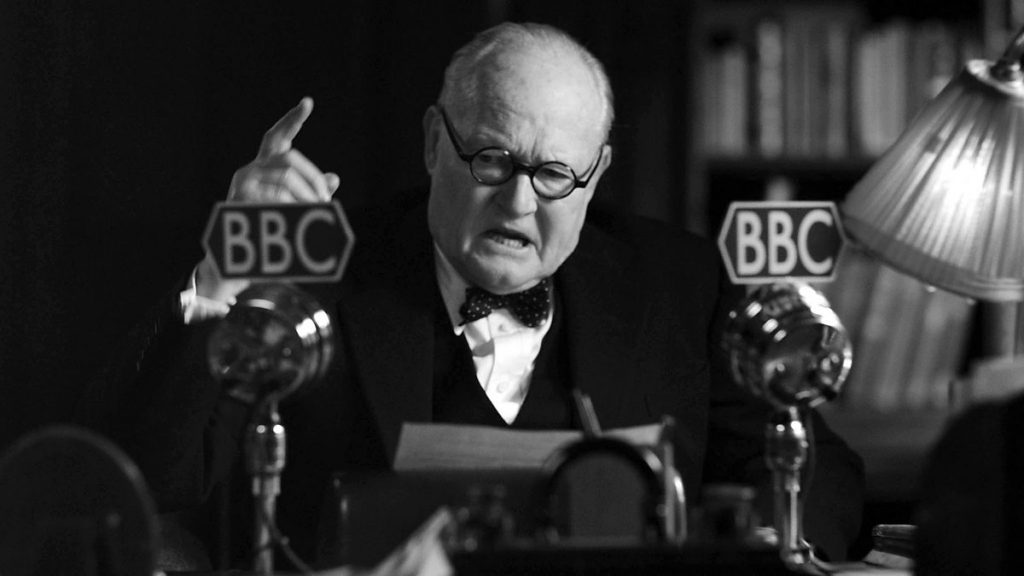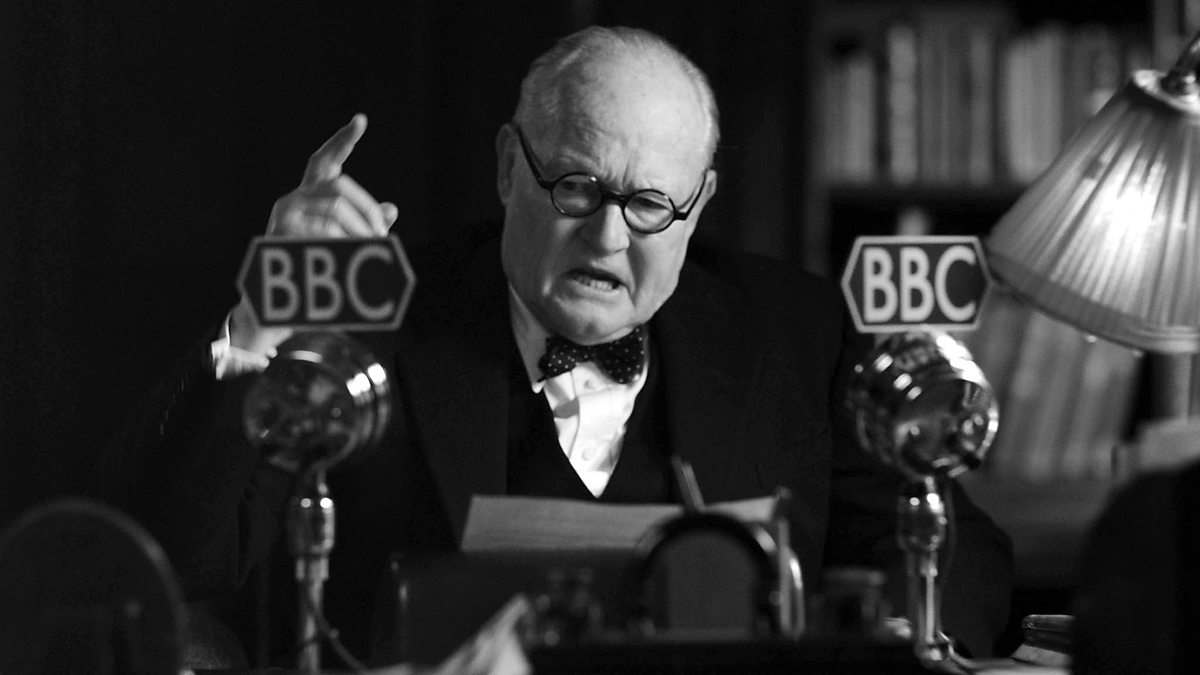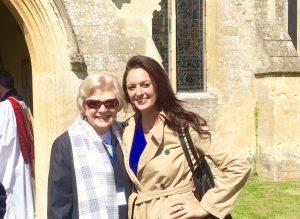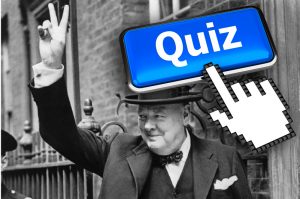Bulletin #84 - June 2015
Churchill: When Britain Said No

June 3, 2015
BBC2 Documentary Both Dubious and Unbalanced
Reviewed for The Churchill Centre by LEE POLLOCK

The fiftieth anniversary earlier this year of the death of Winston Churchill produced an international wave of commemoration and panoply of articles, books, conferences and programs. Churchill remains among the most widely admired—and most regularly quoted—political figures of the past century, especially in America. Despite the ongoing and understandable debate about his place in history, he stands at the apogee of his fame.
While Churchill’s role in history will be legitimately analyzed for centuries, there is a class of Churchill-bashers (more politely “revisionists”) for whom the adulation of the last few months (and decades) cannot pass without a spirited answer. For them his feet of clay are as large as the oversize statue that looms in London’s Parliament Square. And what better forum for these naysayers to utilize than Britain’s state owned broadcast network, the venerable BBC?
The revisionists’ first salvo was Jeremy Paxman’s program (“all the dockworkers hated Churchill”) on the January 1965 state funeral. Now to provide the coup de grace to the Great Man, is “Churchill: When Britain Said No” produced and directed by Christopher Spencer. One can almost hear the voice of John Reith (the Beeb’s longtime and dictatorial Director-General and Churchill nemesis) saying, “I did my best to keep him off the air and now you’ve gone one better.”
Ironically, public broadcasting used to be a source of admiration for Britain around the world but with programs such as this, now seems more an embarrassment. “When Britain Said No” belongs in the dustbin of history along with the nationalized industry that the Labour party brought in when it defeated Churchill in 1945. Certainly the recent U.K. election suggests that a lurch to the left of the kind that carried Clement Attlee to power and expelled Churchill in 1945 no longer has popular appeal.
And since Britain is in the mood for referendums (Scotland last year and EU membership in 2017) an American would wonder if two more questions could be posed: First, do you enjoy the BBC? (answer most likely, yes) and second, would you like it pay-as-you-go and have your television license fee refunded? (Strange to Americans, owning a TV in Britain requires an annual payment of £145 and the near £4 billion raised provides most of the BBC budget.)
The second proposition might garner substantial support, but in the meantime payment of the license fee is vigorously policed—one could say by “some form of Gestapo.”
The 1945 election results remain a puzzle, especially to American admirers of Churchill who, not appreciating British domestic politics, reacted (and still do) with “How could they” shock.
“When Britain Said No” purports to explain the result and is described as containing “surprising revelations” (in reality, rehashing already widely known Churchill controversies) and debating his “weaknesses as well as strengths.” Alas, while the actors are good (portraying Churchill is tricky) and the vintage film footage interesting, it does little of the sort.
In describing his own memoirs of the Second World War, Churchill admitted, “This is not history. It is my case.” But this program is no history either. To use the invective launched at Churchill by Evelyn Waugh, it is “a shifty barrister’s case.” So vehement is the anti-Churchill bias, that one wonders why the production credits are missing the line: “Historical Consultant: Prof. David Irving.”
Had the producers wanted to make the criticism of Churchill transatlantic, they might have interviewed our own Patrick Buchanan, peddler of the assertion in his The Unnecessary War that the Holocaust was Churchill’s fault. (He arrives at this conclusion by arguing that if Britain had made peace with Hitler in 1940, the Fuhrer would have been content to peacefully dominate Europe—perhaps after a swift conquest of the Soviet Union—and no longer bother with death camps for the Jews. This of course forgets about the Einsatzgruppen among other things.)
“When Britain Said No” is so one-sided and hysterical that it actually does a disservice to the revisionist cause. It certainly never utters a balancing word or phrase such as “Even though” or “but.” The program trots out so many Churchill clichés and selective, out-of-context quotes that a general viewer would easily be convinced that this most-admired Briton was a racist buffoon. These include, among many others, one-sided, distorted “discussions” on the Tonnypandy Riots and the 1926 General Strike.
And it picks easy targets:
Yes, Churchill was largely wrong about India and his famous “half naked Fakir” comment about Gandhi (like Churchill the subject of adulation years after death) haunted him since he made it 1931. Yet the program fails to ask if Churchill hated the Indian leader so much, why did he say just a few years later:
“Mr. Gandhi has gone very high in my esteem since he stood up for the Untouchables. I do not like the India Bill but it is now on the Statute Book….[so] make the thing a success. I did not meet Mr. Gandhi when he was in England but I should like to meet him now.”
And Gandhi remarked:
“I have got a good recollection of Mr. Churchill when he was in the Colonial Office and….since then I have held the opinion that I can always rely on his sympathy and goodwill.”
If nothing else, Churchill’s warnings about internecine violence in India came true after partition. And how does his hatred of Indians explain his later good relationship with Nehru? One can imagine the newly installed statue of Gandhi in Parliament Square whispering to him late at night, “Sorry old boy, they’re being rather hard on you.”
And of course, the “Gestapo” comment in the 1945 campaign speech was foolish and ill-advised. His wife Clementine told him so beforehand and Churchill surely regretted it after—and paid the political price.
The program’s litany of other “revelations” about Churchill includes:
—“His policies as Chancellor had lead to a disastrous economic collapse” so he apparently created the Great Depression all by himself. (Hardly, even if the 1925 return by Britain to the Gold Standard—widely held conventional wisdom at the time—was seriously flawed.)
—He was a stubborn, difficult and demanding boss. Long known, but one might wonder how well an easy going and accommodating one would have served Britain in those challenging days. (“I never worry about action, only about inaction” seems a good mantra for fighting a war.)
—As First Lord of the Admiralty, Gallipoli was Churchill’s “master plan” and thus entirely his responsibility. Not a word is uttered about anyone else. The truth is that there is more than enough blame in the Gallipoli campaign to spread among several people.
Ironically, the program misses a few easy targets; for example why not trot out Churchill’s 1920 article about Jews and Bolshevism and the one by a ghostwriter Marshall Diston from 1937 to prove he was anti-Semitic?
And surely Churchill must have been a secret communist sympathizer—just look at all the nice things he said about Stalin from 1941 to 1945.
The experts interviewed in the program (Sir Max Hastings and Anthony Beevor in particular) are well-regarded historians, although more known for their military than their political writing. But one unfamiliar name (at least to American ears) appears frequently, a Mr. Dave Douglass. While the program skips over his credentials, it turns out he is in his own words, “a revolutionary Marxist on the Anarchist left and a member of…..the IWW.” Shades of “Big Bill Haywood and the “loony left” back for a reprise a hundred years on!
Mr. Douglass apparently worked in the coal industry some decades ago but hardly qualifies as having an objective opinion or more importantly, any real knowledge about Churchill. He is a strange choice, the American equivalent of which might be a documentary on one of our Presidents with “expert” commentary by Bob Avakian (of our Revolutionary Communist Party) or even the notorious Lyndon LaRouche. American producers would have better judgment.
Another predictable presence is Prof. John Charmley, the revisionist dean. While Charmley is a successful historian he seems to have gone off the deep end when the cameras rolled for this program. From Prof. Charmley’s barely suppressed smirk, we learn that Churchill was really a proto-fascist, “the equivalent of Nigel Farrage” and one step away from throwing in with Oswald Moseley and the Black Shirts.
According to Charmley, “Churchill’s ideas in the 1930’s had been rather sympathetic towards fascism; at least until 1938 he’d said obliging things about Hitler as well.” Front and center marches a single line from Churchill’s 1937 Evening Standard article to prove the point.
Well if Churchill was a Nazi sympathizer that certainly was not apparent to Goebbels or Hitler in Berlin—but perhaps they were too busy entertaining stronger admirers such as the Duke of Windsor and Lord Londonderry. Prof. Charmley knows that a quick glance at the work of Churchill authorities Sir Martin Gilbert and Richard Langworth would put this nonsense to rest.
And Charmley cannot resist a last jest, informing us that in Churchill’s war memoirs, “every page…broke the Official Secrets Act,” thus apparently throwing him in with Burgess, McLean, and the other British spies of the 1940’s.
The first fifty-five minutes of the program work hard to dig the Churchill reputation a deep grave. The producers then apparently looked up and found themselves at the bottom of a discreditable hole of their own making.
What to do? Furiously spend the last five minutes reminding us, “Oh, by the way Winston Churchill was a great man and saved the world.” Even Field Marshal Alanbrooke said so.
Finally, “When Britain Said No” concludes with a last screen shot, surely confusing to anyone who has just watched the program: In 1951 Churchill stood again for election—and won. Which he did, even though as the program surprisingly fails to note, Labour received some 250,000 more votes than the combined opposition.
The viewer might wonder: how could that be? The program offers no answer and one is left to conclude that either Churchill was not so bad or that the British people having unwisely tossed out the Great Man in 1945, regained their senses and voted him back.
As much as the program’s portrayal of Churchill is a cardboard caricature, that of Labour leader Clement Attlee—a saintly, avuncular pipe smoker—is just as one-dimensional. As Michael Jago’s excellent recent biography points out, “Clem” was a decent, honorable man who worked productively with Churchill during the war-time coalition but then, after initial success as Prime Minister, struggled to govern effectively and play the weak economic and strategic hand that fell to Britain after the war. Churchill played the even weaker hand dealt by Adolf Hitler in 1940 superbly well.
And without applying the same torch to Attlee as “When Britain Said No” does to Churchill, he too was not immune to the prejudices of his day as his comments about American Jews noted by Jago testify. (Incidentally, the program garbles the Churchill quote about Attlee; Harry Truman actually said “He struck me as a very modest man” to which Churchill replied, “He has much to be modest about.”)
American conservatives often lament the perceived liberal bias in our Public Broadcasting System. But no PBS station would ever run a program about an American leader as unbalanced and inaccurate as this. The future response to such critics may be, “It could be worse—look at the BBC.”
Churchill: When Britain Said No first aired on BBC2 on 25 May 2015 and produced by Oxford Film and TV with Executive Producers Susan Jones and Nicholas Kent.
Lee Pollock is Executive Director of The Churchill Centre. The opinions expressed are those of the author alone and not The Churchill Centre.
Subscribe
WANT MORE?
Get the Churchill Bulletin delivered to your inbox once a month.






